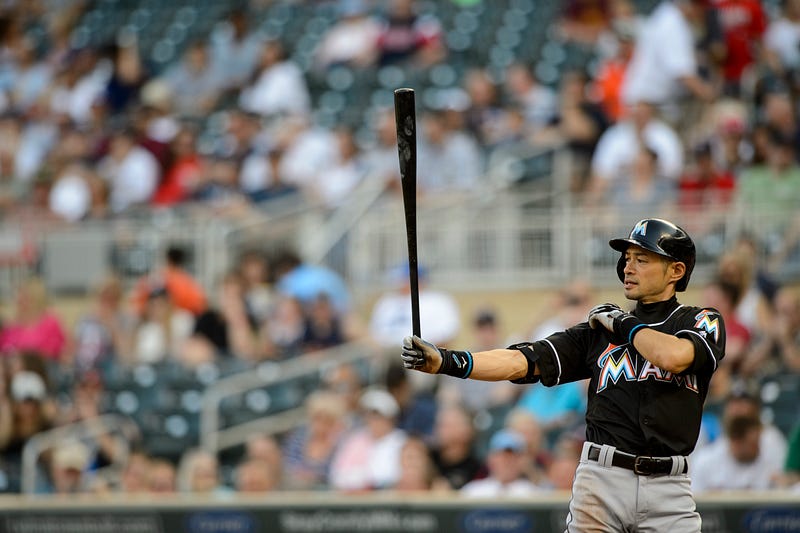Appreciating Ichiro Suzuki’s worldly claim to baseball history – The Ringer (blog)
Shut Up and Play the Hits
Appreciating Ichiro Suzuki’s worldly claim to baseball history

My condolences to those who have lost loved ones in the Great Ichiro War of 2016.
This week, tensions escalated in certain corners of Baseball Twitter, a community that embraces numbers, spreadsheets, and order. But last night, confusion and chaos reigned.
This much is agreed upon: Ichiro Suzuki, lately of the Marlins, formerly of the Mariners and Yankees, has had a phenomenal career. But the question of just how phenomenal — and, more to the point, where his career stands in comparison to other phenomenal careers — is very much a point of contention.
This has come to a head this season because Ichiro is on the verge of reaching one of baseball’s great benchmarks: hit no. 3,000. The 3,000 hit club is a murderers’ row of legendary bats: Ty Cobb, Hank Aaron, Stan Musial, and Willie Mays, among others, including most recent entries Derek Jeter and Alex Rodriguez. At the top of it all sits Pete Rose, hit king of baseball, who racked up 4,256 over the course of a 24-season career and remains, his supporters say, essentially untouchable.
But here’s the thing: Ichiro already joined the 3,000 hit club eight years ago, depending on whom you ask. Before joining the Mariners in 2001, Ichiro spent nine seasons with Japan’s Orix Blue Wave, where he dominated Nippon Professional Baseball, recording 1,278 hits. Since then, Ichiro, who’s batting an incredible .350 this year after a three-hit Monday against the Padres, has logged an additional 2,977 hits, putting his total at 4,255: just one hit behind Rose’s record.
No less an authority than MLB.com celebrated Ichiro when he reached hit no. 4,000 back in 2013. But his pursuit of the record — and his imminent surpassing of Rose — has received relatively little attention. There’s a reason for that: A whole lot of baseball fans think Ichiro’s hits in Japan shouldn’t count.
Pete Rose, who never met a moral ambiguity he didn’t prod with a stick, has used the debate over Ichiro’s record to attack Japanese baseball for what he appears to think is an affront on him.
“It sounds like in Japan they’re trying to make me the Hit Queen,” Rose told USA Today, remarking on Japanese media’s feverish coverage of Ichiro’s record. (Unsurprisingly, most in Japan are content to include Ichiro’s entire body of work.) “I’m not trying to take anything away from Ichiro, he’s had a Hall of Fame career, but the next thing you know, they’ll be counting his high school hits.
“I don’t think you’re going to find anybody with credibility say that Japanese baseball is equivalent to major league baseball. … It has something to do with the caliber of personnel,” he said.
At present, there are three major camps. There are those who count all of Ichiro’s hits in professional baseball, wherever they occurred, placing his career total one behind Rose’s. There are those who say, sure, we can count the hits in Japan — but in that case we should also include Rose’s minor league hits (427), leaving Ichiro 428 hits behind, a gap the 42-year-old is exceedingly unlikely to bridge. And there are those who say only MLB hits should count, leaving Ichiro 1,279 notches in the distance.
(There’s also a subset of fans arguing that hits in the All-Star Game should be included. Rose had seven and Ichiro has had eight. If you include Ichiro’s Japanese numbers but not Rose’s minor league hits, the two are now in a dead heat: 4,263 career hits apiece. This is a bit of a fanciful manipulation: All-Star numbers are not traditionally included in hit totals. But if you want to send one of Rose’s backers into a rage, these are the stats to cite.)
To be very clear: Nippon Professional Baseball is not Major League Baseball. Rose is right: players have succeeded there who would not — or did not — thrive in American baseball. But equating the Japanese game to the American minors — or, worse, comparing it to high school games, as Rose did — reflects a refusal to acknowledge that there is something beyond an American baseball monoculture. Ichiro’s accomplishments in Japan need not be viewed in contrast to what he has achieved in the United States: That he was able to succeed to such a degree on both sides of the Pacific is an incredible thing. Ichiro’s 4,255 is not the same as Rose’s 4,256 — but it is a tremendous achievement and should be celebrated as such.
Very soon, Ichiro will reach MLB hit no. 3,000: As of Tuesday afternoon, he is just 23 hits away. This is a testament to his talent and longevity, given that he didn’t join Major League Baseball until he was 27 years old. But the other record he’s eyeing requires your imminent attention. You’d be wise to look to San Diego tonight, where Ichiro could very well make baseball history.






